Origin Genesis Review: Triple Titan Terror
by Ryan Smith on April 23, 2013 9:00 AM ESTApplication and Futuremark Performance
Though our Genesis system is primarily intended for gaming, with gaming being such a resource-intensive hobby it tends to follow that the Genesis is also an incredibly high performer at virtually everything else. The 4.9GHz SNB-E processor is as fast as they come right now, and with the triple Titans and RAID-0 SSDs backing it up, it’s clear there are very few computers that will come anywhere close to the Genesis.
As such our standard application and Futuremark benchmarks are here mostly because they’re obligatory. We simply haven’t reviewed any prior systems, even other SNB-E systems, that are as powerful as the Genesis. It takes the top spot in everything.
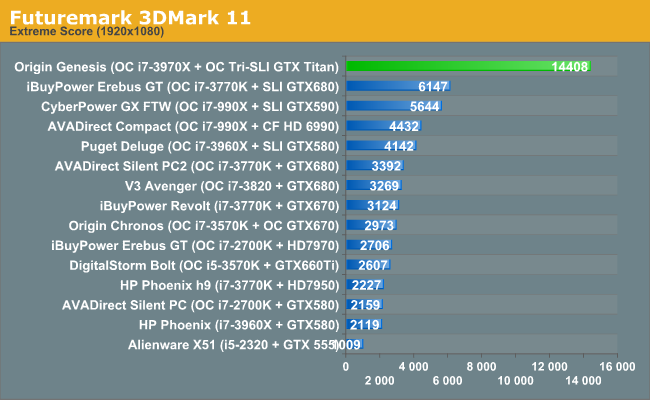
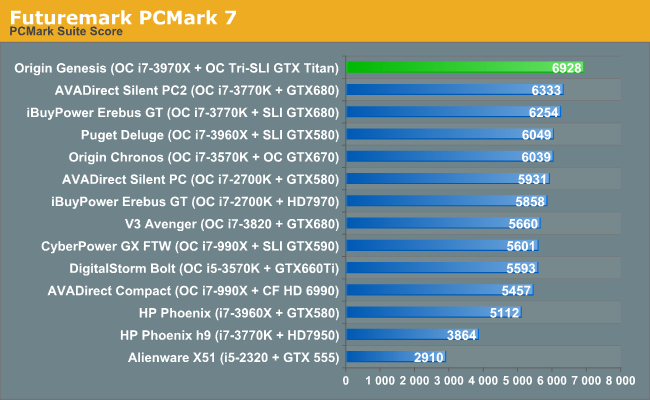
The Genesis more than doubles the 3DMark performance of the next-fastest system we’ve reviewed, an overclocked IVB + GTX 680 SLI configuration. Meanwhile the PCMark scores are much closer since most of the PCMark score is determined by CPU and storage performance rather than GPU performance, but thanks to the hefty overclock on its i7-3970X processor, the Genesis is still almost 700 points ahead of the next-closest system.
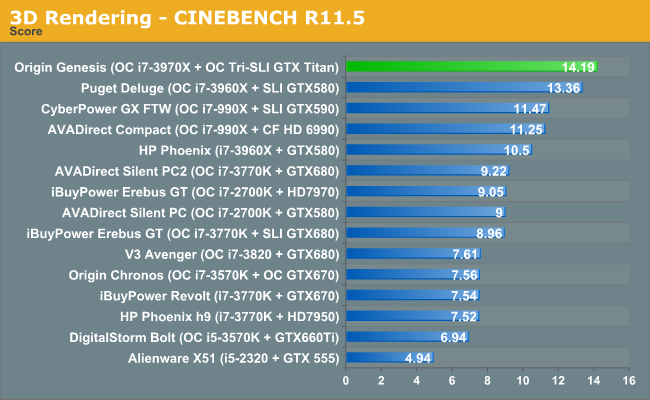
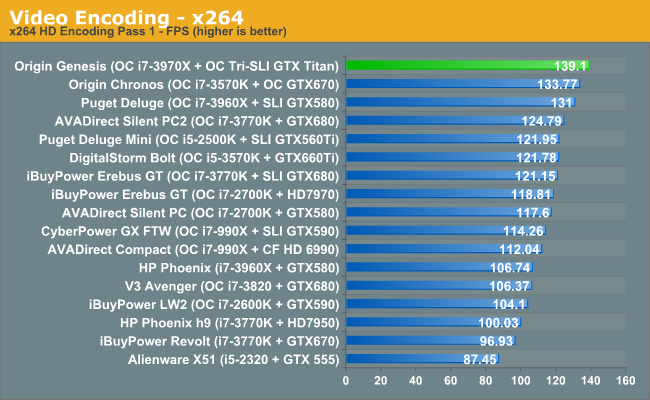
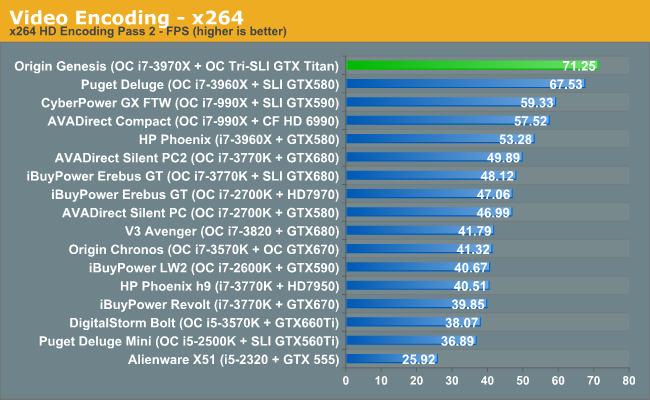
Diving into our CPU-dependent benchmarks, the story is much the same. Thanks to the CPU overclock, the 4.9GHz SNB-E processor means the Genesis pushes past even other SNB-E systems in both Cinebench and x264 encoding. At this point the Genesis is approaching the limit for what any kind of single-socket consumer system is going to be able to achieve.
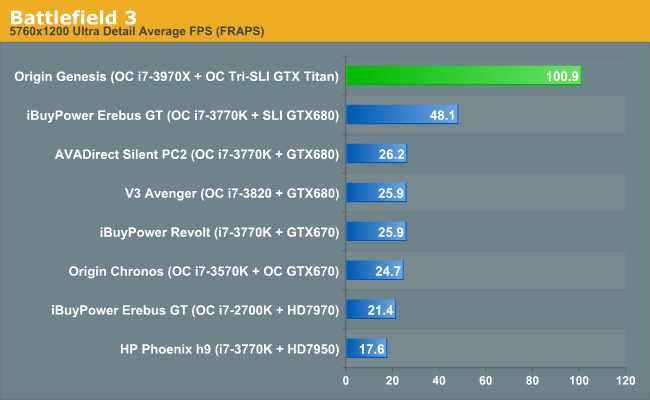
Finally, we’re throwing in one of our standard gaming benchmarks before going into tri-SLI Titan’s performance in-depth. Even at 5760x1200 with Ultra settings, Battlefield 3 is hard-pressed to keep 3 Titan cards occupied, with the Genesis delivering 100fps. 3D Surround BF3, anyone?










63 Comments
View All Comments
RonanH - Tuesday, April 23, 2013 - link
meh, it's obviously quick, but noisy, hot and draws a hell of a lot of power. Also choice of motherboard is not great and only 2x120Gb SSD for that money I'd want a TB :p Finally no dedicated sound card. If you care that much about game visuals and are driving a surround display (otherwise why buy this) then you want the best in surround sound too.A5 - Tuesday, April 23, 2013 - link
If you're dropping $9K on a computer, you should just use the motherboard's digital output to drive your dedicated sound system (whether its a headphone amp or receiver + surround speakers).A5 - Tuesday, April 23, 2013 - link
Also, there aren't any expansion slots left due to the 3x Titans. You'd have to use a USB sound card or "settle" for 2 Titans if you didn't want to a dedicated sound system.RonanH - Tuesday, April 23, 2013 - link
one of the reasons I said it was a poor choice of motherboard. I never thought of the digital output, I don't live in the hi-fi separates demographic I guess, nor in the $9k pc one either!Golgatha - Tuesday, April 23, 2013 - link
Or just use the nVidia HD Audio for a lossless bitstream to an external surround sound receiver.MattKatz - Thursday, October 9, 2014 - link
It's a lot of money to drop on Origin Genesis... in my opinion there are much more price-worthy options on the market (especially now, this review is slightly old). /Matt from http://www.consumertop.com/best-desktop-guide/Ananke - Tuesday, April 23, 2013 - link
The mobo has optical out - that is good for 5.1 surround anyway. So, you essentially use 3 or 6 projectors for video surround, and pre amp or receiver for audio. At that point the $9k computer is negligible expenditure :):):) as part of the entire setup. And yes, I have seen such.DanNeely - Tuesday, April 23, 2013 - link
At this price we're looking at what are in effect fully custom systems; and since nVidia paid for the box as a GPU demo and AnandTech isn't setup for hifi testing anyway there wasn't any reason to put a dedicated card in. If you wanted one they'd find a combo to make it work (although looking at boards on Newegg that might mean going to an XLATX system for even more hugeness).s44 - Tuesday, April 23, 2013 - link
The best in surround sound requires HDMI from the vidcard, not a sound card. No soundcard can compare to the DAC/DSP on a dedicated prepro or AVR.bobbozzo - Tuesday, April 23, 2013 - link
HDMI w audio may be fine for HTPC, but for gaming, you probably want video to your monitor, and audio to your stereo, so HDMI audio would just make things more complicated; you'd have to have an A/V receiver, and it'd have to be powered on anytime you want to use your computer/monitor.